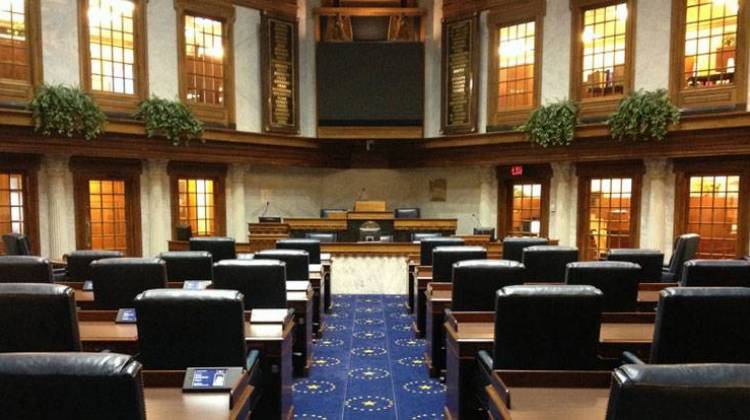
The lawsuit questioned if having stickers supporting LGBTQ+ students on Smiley’s water bottle would also fall under “instruction.”
Lauren Chapman/IPB NewsThe ACLU of Indiana has filed a lawsuit to halt Indiana’s so-called “Don’t Say Gay” law. Court documents said the act’s lack of definitions about “human sexuality” and “instruction” mean teachers don’t know what they can and can’t teach.
If found in violation of HEA 1608, teachers could have their licenses suspended or revoked. The lawsuit was filed on behalf of Indianapolis Public Schools teacher Kayla Smiley.
According to court documents, Smiley has a book corner for her first through third graders, which includes age-appropriate books on figures throughout history like Harvey Milk and Elton John. Smiley said she doesn’t know if these would violate the new law as “instruction” on human sexuality. And further, the lawsuit questioned if having stickers supporting LGBTQ+ students on Smiley’s water bottle would also fall under “instruction.”
“In an effort to teach basic tolerance of others and to express her personal beliefs, she carries a water bottle in class, in the halls, and before and after school, which has on it stickers and pins supporting LGBTQ rights, such as a statement that 'Trans rights are human rights,' and that displays rainbow flags that are widely recognized as the symbol of LGBTQ pride,” the ACLU’s lawsuit said. “She is unsure if she is still allowed to engage in this display outside of her class or what to do if the display prompts a discussion in her class.”
READ MORE: Indiana lawmakers file record number of anti-LGBTQ bills, tripling previous years
Join the conversation and sign up for the Indiana Two-Way. Text "Indiana" to 73224. Your comments and questions in response to our weekly text help us find the answers you need on statewide issues. And follow along on legislative issues with our bill tracker that is still being updated.
Under the measure, teachers would be allowed to answer questions about human sexuality if prompted by their students. But the lawsuit said it isn’t clearly defined where teachers’ licenses would be at risk by answering student questions.
“HEA 1608 is written so broadly that it would be next to impossible for teachers to determine what they can and cannot say to students,” said Ken Falk, ACLU of Indiana legal director, in a statement. “In addition, teachers have a First Amendment right to express themselves as private citizens outside of the classroom, including in the school’s hallways, playground, or before and after school, but the vagueness of this law would certainly have a chilling effect on those rights.”
During multiple floor debates through the legislative session, the measure’s author and sponsor didn’t elaborate on those definitions when questioned about similar potential situations.
The ACLU’s lawsuit argued, based on First Amendment and due process concerns, a federal court should rule the law is unconstitutional.
House Enrolled Act 1608 takes effect July 1.
Lauren is our digital editor. Contact her at lchapman@wfyi.org or follow her on Twitter at @laurenechapman_.
9(MDAyMzk1MzA4MDE2MjY3OTY1MjM5ZDJjYQ000))
 DONATE
DONATE






 Support WFYI. We can't do it without you.
Support WFYI. We can't do it without you.